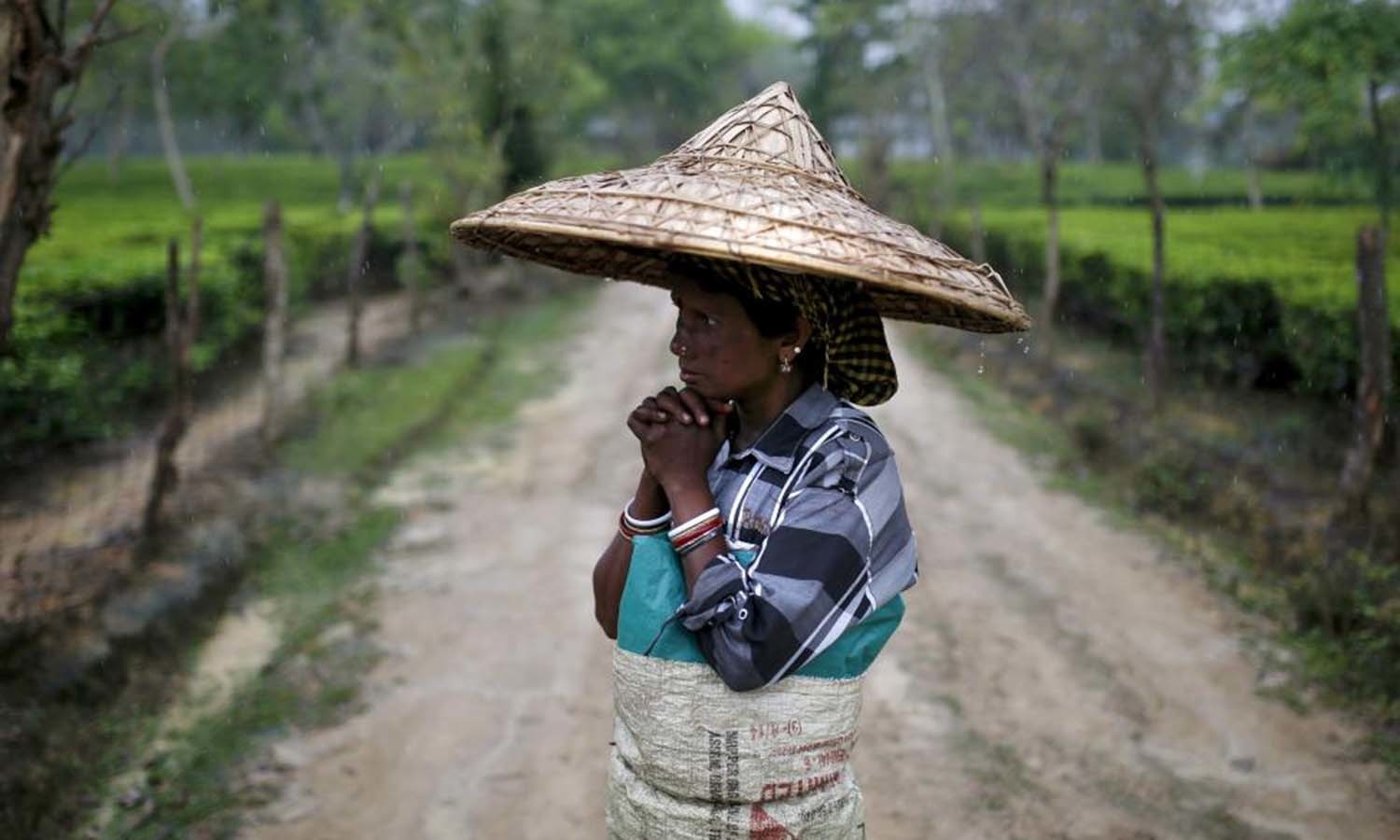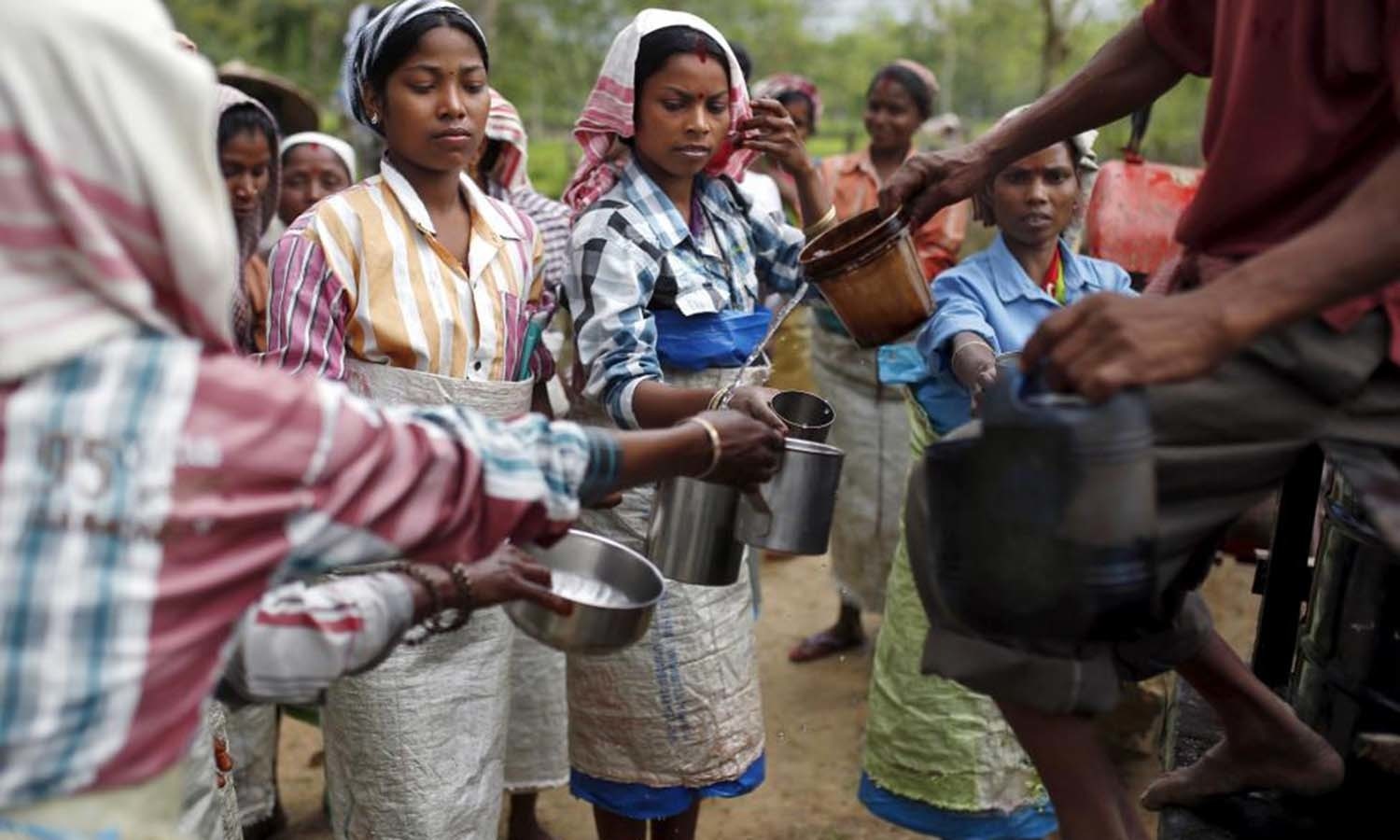Climate change sparks tension in India's tea gardens
 |
| Tea garden workers pluck tea leaves inside Aideobarie Tea Estate in Jorhat in Assam, India, April 21, 2015. — Reuters |
Usha Ghatowar smiles wryly when asked about the pay she earns picking leaves at a colonial-era tea garden in Assam.
"Do you think 3,000 rupees are enough when your monthly expenses can be double that?" she mumbles, as she puts on her "jaapi" hat of woven bamboo and palm leaves and takes a sip of tea from a steel mug.
As the women workers around Ghatowar nod in agreement the heavens open - it has started raining heavily in recent days after three largely dry months.
Unrest is brewing among Assam's so-called Tea Tribes, whose forefathers were brought here by British planters from neighbouring Bihar and Odisha more than a century ago, as changing weather patterns upset the economics of the industry.
 |
| Tea garden workers huddle under an umbrella as they wait for the rain to stop to resume their work inside Aideobarie Tea Estate in Jorhat in Assam. — Reuters |
 |
| A tea garden worker wearing a jappi hat made out of bamboo and palm leaves waits for the rain to stop to resume her work inside Aideobarie Tea Estate in Jorhat in Assam. — Reuters |
Scientists say climate change is to blame for uneven rainfall that is cutting yields and lifting costs for tea firms such as McLeod Russel (MCLE.NS), Tata Global Beverages (TAGL.NS) and Jay Shree Tea (JYST.NS).
While rainfall has declined and become concentrated, temperatures have risen - ideal conditions for pests like looper caterpillar and tea mosquito to infest the light green tea shoots just before they are ready to be plucked for processing.
Use of pesticides and fertilisers has nearly doubled as a result in Assam's 800 big tea plantations, known as gardens, and the rising costs are making Indian tea less competitive.
As a result, firms in Assam are resisting calls from activists and student leaders to lift the daily wage of tea workers from about $2 agreed to recently, blaming weak prices and the doubling of crop expenses over the past 10 years.
Assam Chief Minister Tarun Gogoi, whose Congress party was routed by Prime Minister Narendra Modi's Bharatiya Janata Party (BJP) in the 2014 general election, has sided with the workers ahead of state polls due early next year.
Courting the tea vote
 |
| A tea garden worker plucks tea leaves inside Aideobarie Tea Estate in Jorhat in Assam — Reuters |
State elections have national significance in India - Modi needs to win most of the state assembly contests in the next four years if he is to take control of the upper house of parliament and ease the passage of his reform agenda.
Tea tribe votes can swing results in about a quarter of the seats in Assam, the country's main growing area, and the BJP has been making inroads.
In an interview to Reuters, Gogoi denied an opportunistic motive behind his call for the wage to be raised to about $3 a day.
"I had warned the tea planters about climate change but they did not take care for a long time," Gogoi said. "They thought it would be easy money. I can't allow injustice for tea labourers."
Assam Tea Planters Association (ATPA) Chairman Raj Barooah said they would examine Gogoi's demand but "there has to be a fair wage that can sustain the industry".
The average temperature in Assam has risen by 1.4 degrees Celsius in the past century and rainfall is down by 200 mm a year, said RM Bhagat, chief scientist at the Tea Research Association in Assam's tea hub of Jorhat.
"In the last 30 years we have seen that the magnitude of the effect of climate change is pretty high," he said. "Rainfall has gone topsy-turvy. There is either too much or too little water, forcing planters to use sprinklers on what is a rain-fed crop."
 |
| Tea garden workers take a break from plucking tea leaves inside Aideobarie Tea Estate in Jorhat. — Reuters |
 |
| Tea garden workers pluck tea leaves inside Aideobarie Tea Estate in Jorhat in Assam. — Reuters |
Several tea garden labourers and planters Reuters spoke with said tea factories in Assam now only run for about six months compared with round-the-year operations earlier.
Less rainfall resulted in an 8 percent fall in tea exports last year, according to the Indian Tea Association (ITA).
India is the world's No.2 tea producer but is less export-oriented than other producers thanks to its big home market, and Sri Lanka has been extending its lead as the world's third largest exporter behind China and Kenya.
Learning to adapt
 |
| Tea garden workers collect drinking water during a break inside Aideobarie Tea Estate in Jorhat in Assam. — Reuters |
Labour accounts for 60 per cent of the total costs for tea firms in Assam, whose prices last year were higher than those auctioned in Mombasa in Kenya, Chittagong in Bangladesh, Limbe in Malawi and Indonesian capital Jakarta.
Profit margins at Kolkata-based McLeod Russel, the world's largest tea producer, are estimated to have fallen to their lowest in six years in the year ended March 31, according to Thomson Reuters data.
To cut labour costs, tea companies like Aideobarie Tea Estates, owned by ATPA's Barooah, are exploring greater use of machines to harvest and spray nutrients or pesticides.
Barooah, whose company employs 48-year-old leaf plucker Ghatowar, her husband and now her eldest son, is also thinking of expanding into high-margin white tea made from tea buds.
Other tea gardens have moved to cultivating black pepper, turmeric, ginger, vegetables and fruit alongside tea, while Indian scientists are testing tea varieties that can adapt and survive in hotter and drier conditions.
But in the face of long-term climate change, that may not be enough.
"With rain so scarce, a day may come when Assam will not grow tea any more," said tea scientist Subhash Chandra Barua.
"Planting a crop is fine but economic cultivation may not be feasible".
 |
| Tea garden workers pluck tea leaves inside Aideobarie Tea Estate in Jorhat in Assam. — Reuters |
 |
| Tea garden workers carrying tea leaves over their heads after plucking them from a tea estate, walk at Jorhat in Assam. — Reuters |
 |
| A tea garden worker plucks tea leaves inside Aideobarie Tea Estate in Jorhat in Assam. — Reuters |
 |
| Tea garden workers wearing jappi hats made out of bamboo and palm leaves wait for the rain to stop to resume their work inside Aideobarie Tea Estate in Jorhat. — Reuters |
 |
| Tea garden workers wearing jappi hats made out of bamboo and palm leaves wait for the rain to stop to resume their work inside Aideobarie Tea Estate in Jorhat in Assam. — Reuters |
 |
| Tea garden workers take a tea break from plucking tea leaves inside Aideobarie Tea Estate in Jorhat in Assam. — Reuters |
 |
| Tea garden workers arrive to weigh tea leaves after plucking them from a tea estate in Jorhat in Assam,. — Reuters |
 |
| Freshly plucked tea leaves are seen in the hand of a tea garden worker inside Aideobarie Tea Estate in Jorhat in Assam. — Reuters |
 |
| Tea garden workers rest during a tea break inside Aideobarie Tea Estate in Jorhat in Assam. — Reuters |
 |
| Tea garden workers pluck tea leaves inside Aideobarie Tea Estate in Jorhat in Assam. — Reuters |
 |
| A tea garden worker holds a bunch of plucked tea leaves inside Aideobarie Tea Estate in Jorhat in Assam,. — Reuters |

